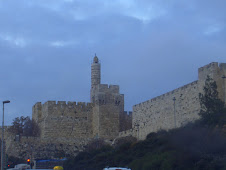
To speak about the Jerusalem Day, we need also to speak about the Ammunition Hill Battle in June 1967. Both concepts are going hand in hand. It is true that, when we hear the word “Jerusalem”, we think about the Old City, the Kotel [Western Wall], the Shuk [the Arab market] and the different holy places that any person can find in this great and unique City.
Last May 11, Israel celebrated Jerusalem Day. The first thing we went to the Old city of Jerusalem, there we saw a big party. No, there was not a band neither food, just people dancing with the flag of Israel. Soldiers, the young, and those who were not so young, were dancing in big “HORA” (as we call it in Israel is a circle dance) with Israelis flags at the Kotel, it was not as many people as I expected, but It was great!
Songs, dances and happiness spread throughout the Holy City of Jerusalem. The happiness was contagious, we were invited to dance, separately -- and, of course we dance, we celebrate the Day of Jerusalem with the people who were there. We also pray to G-d to help us to keep Jerusalem forever.


From there, we took the number 1 bus to the “new” city and then the bus 19 which took us to the Ammunition Hill. Last time I was there, it was just a few years after the Six Day War. I do not remember seeing a museum and all the pictures that I saw today. It was just a lot of trenches. Also, there still were the concertina wires in every trench, and the person who took me there, in 1973, who also was one of the soldiers who fought in this battle, told me amazing stories that he remembered about this battle, his friends, and his feelings.
Here is a picture of the Entrance to the Ammunition Hill

Today, now that I have returned, there is a museum, in one of the old bunkers. I saw pictures, watched a video and heard the song that was written for this battle. No more concertina wires, no more trenches were there to walk in, rather, we just watched the stones as witness to one of the big battles in which the parachutes participated to bring us back Jerusalem.
Here is the link from which you can listen to the song and see many of the soldiers who were fighters at the גבעת התחמושת (Ammunition Hill) on June 6, 1967, the second day of the Six Day War. http://www.dailymotion.com/video/x9dil3_ammunition-hill-song-idf-musical-te_music
Here also some pictures which one of the soldiers had drawn about the bloody and amazing battle here at the Giv’at Hatachmoshet.






When we were leaving the Giv’at, we meet a group of parachutists who were waiting for the big event, that night, to honor the soldiers who fell in this war. This group of soldiers was just between 18 to 20 years old, the same age as those who fell in 1967. They were from the same brigade (Paratroops Brigrade) as that of the soldiers who gave their lives to liberate the old city and give Her (Jerusalem) back to us. So, we can go back to the wall and the City of David without fear, free as the doves we saw that day around the Kotel.
We took pictures of the soldiers; they were having lunch, as one of them answered me when I ask him ?האוכל טעים[Is the meal tasty?], and he answer with a big smile
אין מן אוכל של אמא [There is nothing like Mom’s food!] I told him, "you are right and thanks a lot for taking care of us!"



Until my next blog, Rifka



